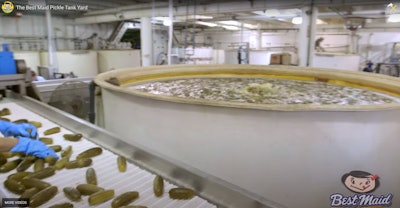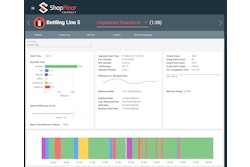Key takeaways:
· Best Maid Pickles transitioned to an enterprise resource planning system, Plex, from Rockwell Automation, to meet higher Safe Quality Food certification levels.
· Plex's cloud-based system significantly improved Best Maid's inventory management, financial processes, and overall agility, allowing for real-time margin analysis, quicker pricing decisions, and streamlined operations.
· The implementation of Plex's material requirements planning functions led to a notable reduction in safety stock resulting in a substantial annual saving of $500,000.
Why it’s important:
The case of Best Maid Pickles illustrates how a cloud-based ERP system can drive operational efficiency, improve inventory management, and deliver substantial returns on investment for a century-old company.
The details:
Best Maid Pickles, founded in 1926 and now the largest pickle manufacturer in Texas, faced the need for higher Safe Quality Food (SQF) certification levels in 2016 due to rapid growth and private label packing for a large company. To modernize its operations, the company sought an enterprise resource planning (ERP) system, and in 2016, they selected Plex by Rockwell Automation for its cloud-based design, user-friendliness, and tailored implementation strategy.
The Fort Worth site, equipped with 800 tanks capable of holding 35 million pounds of cucumbers, had relied on traditional methods for scheduling and inventory management.
During a presentation at Rockwell Automation Fair in Boston, Lance Heinen, Best Maid’s vice president of supply chain and finance, described the set up that had served the company well for decades, but was in need of modernization.
“At the time, we had a good plant manager. He was a great guy, but he based the schedule on feel. So, he would say, ‘I feel like we haven’t run this product recently, so I think we are going to put it on the schedule because I feel like we are going to need to ship it.’ And that was our demand planning,” Heinen said, noting there wasn’t a lot of technology implemented at the manufacturing plant. Even inventory management was performed by one person counting and recording information in an Excel spreadsheet. “So, to go from that to some very specific customer requirements on timing, we knew we needed to change what we were doing.”
The company also knew an enterprise resource planning (ERP) system was the answer. But the transition had to be seamless and easy for non-technical users. Plex was ultimately chosen for its suitability for shop floor operations and a well-defined implementation strategy. The selection occurred in 2016, and by August 2017, the system went live without disruptions. Despite the cultural shift of adapting to new measurement units and the transition from computers to tablets for material operators, the Plex team effectively integrated Best Maid's processes into the system.
The Plex system has noticeably improved the company’s inventory management as well as streamlining financials. “On the financial side, it would take us three to four months to close a period. So, we were constantly operating pretty far behind, which in today’s age, you can’t make decisions four months after, you have to be able to make it today and you have to know where you stand on your margins today. Before Plex we were absolutely not able to do that,” Heinen said.
The material requirements planning (MRP) functions of Plex played a crucial role in reducing safety stock. Best Maid, which previously maintained a year's supply of every raw material, now relies on Plex's MRP to determine needs for the next week or month. This shift led to a substantial reduction in raw material holdings from six to 12 months to just six to 18 weeks, resulting in a $500,000 annual saving.
Furthermore, the implementation positively impacted other areas, such as labeling. Plex's serialized inventory system enhanced visibility, eliminating about $50,000 in annual lost revenue from mislabeled items. With approximately 180 different SKUs, the company can now ensure the correct labels are applied, reducing the risk of revenue loss.
Best Maid also benefited from enhanced visibility into its processes, particularly in managing orders. Previously, without a warehouse management system (WMS), the company would only realize a shortage in an order when the truck arrived for pickup. Plex's MRP provided insights into inventory levels, allowing for better visibility, schedule adjustments, and improved tracking of incoming and outgoing goods.
To assess the return on investment (ROI) of the Plex implementation, Nucleus Research conducted a detailed investigation, revealing an annual average of 185% ROI. This calculation considered the net benefits of Plex minus the costs, including the implementation process, consulting services, subscription costs for the first year, and training elements. The impressive ROI was achieved within the first six months of deployment.





















